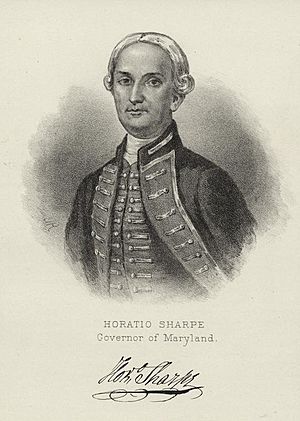Horatio Sharpe facts for kids
Quick facts for kids
Horatio Sharpe
|
|
|---|---|
 |
|
| 11th Governor of Restored Proprietary Government | |
| In office 1753–1768 |
|
| Preceded by | Benjamin Tasker Sr. |
| Succeeded by | Robert Eden |
| Personal details | |
| Born | 1718 Hull, Yorkshire, England |
| Died | November 9, 1790 (aged 71–72) Hampstead, London, England |
| Profession | colonial governor |
Horatio Sharpe (1718 – November 9, 1790) was an important leader in the American colonies. He served as the 22nd governor of Maryland from 1753 to 1768. During this time, Maryland was still a British colony.
Contents
Horatio Sharpe: Maryland's Governor
Early Years and Family Life
Horatio Sharpe was born in 1718 in Hull, a town in Yorkshire, England. His parents were William Sharpe Sr. and Margaret Beake. Horatio was one of 16 children in his family. Many of his brothers and sisters lived to adulthood.
His brother, Gregory Sharpe, became a chaplain to King George III. Another brother, William Sharpe, worked as a clerk for the council. His brother, John Sharpe, was a lawyer who worked for the government.
A Leader in Maryland
Horatio Sharpe began his career in the military. In 1745, he became a Captain in the King's army. He fought in a conflict in Scotland called the Jacobite rising of 1745. He also served in the West Indies as a Lieutenant-Colonel.
In 1753, Horatio Sharpe was chosen to be the governor of Maryland. He was appointed by Frederick Calvert, 6th Baron Baltimore, who was the owner of the Maryland colony. Sharpe arrived in Maryland in August 1753.
The King also appointed Sharpe as the Royal Commander in Chief of all British forces in the American colonies in 1754. This meant he was in charge of protecting Virginia and other nearby colonies. However, a higher-ranking officer, Major General Edward Braddock, arrived in 1755 and took over this role.
Sharpe was known as a skilled leader. He was good at managing both government and military affairs. He was also a farmer, a horse lover, and enjoyed hosting guests. He was friends with famous figures like George Mason and George Washington.
Life at Whitehall
Horatio Sharpe also built a large home called Whitehall. It was located near Annapolis, the capital of Maryland. Whitehall was designed by Joseph Horatio Anderson, who also designed the Maryland State House.
Whitehall became Sharpe's home after he retired from being governor in 1769. He lived there until he returned to England in 1773. He enjoyed farming at Whitehall. Like many large farms in that era, the work was done by enslaved people.
Later Life and Legacy
In 1773, Horatio Sharpe went back to England to take care of family matters. He stayed there until he passed away in 1790. During the American Revolutionary War, Maryland passed a law in 1780 that allowed Sharpe to sell his lands in Maryland.
He sold or gave his properties to his secretary, John Ridout. Ridout had stayed in Maryland during the war to look after Sharpe's property.
Sir Robert Eden became the next governor of Maryland after Horatio Sharpe in 1769. Eden was the last British Royal Governor of Maryland.
Sharpe died on November 9, 1790, in Hampstead, London, England.
In 1763, a town in Maryland was named Sharpsburg, Maryland in his honor. This was done by his friend, Joseph Chapline, who founded the town.
 | Kyle Baker |
 | Joseph Yoakum |
 | Laura Wheeler Waring |
 | Henry Ossawa Tanner |

